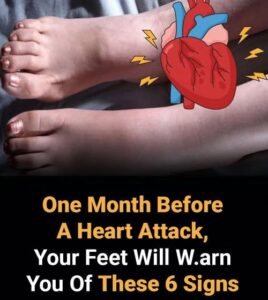7 Subtle Signs Your Body Might Show Weeks Before a Heart Attack

Heart disease remains the leading cause of death in the United States, and heart attacks are one of the most critical emergencies it can cause. While lifestyle choices like healthy eating, regular physical activity, and stress reduction can go a long way in protecting your heart, one often-overlooked aspect of prevention is awareness.
In many cases, the body begins to send out signals well before a heart attack occurs—sometimes even a month in advance. Recognizing these early warning signs can give you the time needed to seek help and prevent a more serious outcome.
Here are seven symptoms that may signal your heart needs attention:
1. Swelling in the Feet or Ankles
Unusual swelling in the lower extremities could be linked to poor circulation. When the heart struggles to pump blood effectively, fluid may begin to accumulate in the legs, ankles, or feet—known as edema. If this swelling is persistent or unexplained, it’s worth discussing with your doctor.
2. Persistent Fatigue
Feeling unusually tired, even after getting enough rest, might be your body’s way of indicating reduced blood flow. When arteries narrow, the heart works harder to supply oxygen and nutrients, which can leave you feeling drained or weak throughout the day.
3. Shortness of Breath
Breathing difficulties during normal activities—or even while resting—could be related to an imbalance between the heart and lungs. If your heart isn’t pumping efficiently, your lungs may not receive enough oxygen. This connection makes unexplained breathlessness an important symptom to take seriously.
4. Sudden Weakness
If you suddenly feel weak or lightheaded, especially without a clear cause, it may be due to restricted blood flow. Weak muscles or unexpected shakiness can be early signs that your cardiovascular system isn’t delivering what your body needs.
5. Lightheadedness and Cold Sweats
Feeling dizzy, faint, or experiencing cold sweats without exertion could indicate a drop in blood flow to the brain. These signs, especially when paired with nausea or confusion, should not be brushed off.

6. Chest Discomfort or Pressure
A sense of tightness, heaviness, or mild pain in the chest is one of the most commonly reported symptoms leading up to a heart attack. This feeling may come and go over time but typically becomes more intense leading up to an emergency.
7. Flu-Like Symptoms
Some individuals report symptoms similar to the flu—such as fatigue, body aches, or even nausea—days before experiencing a cardiac event. While not always related, if flu-like symptoms appear with any of the signs above, it’s better to err on the side of caution.
What to Do If You Notice These Signs
If you or someone close to you experiences any combination of these symptoms, especially if they’re new or worsening, don’t wait. Contact a healthcare provider immediately.
Early intervention could make all the difference. Being proactive about your heart health isn’t just smart—it’s potentially life-saving.